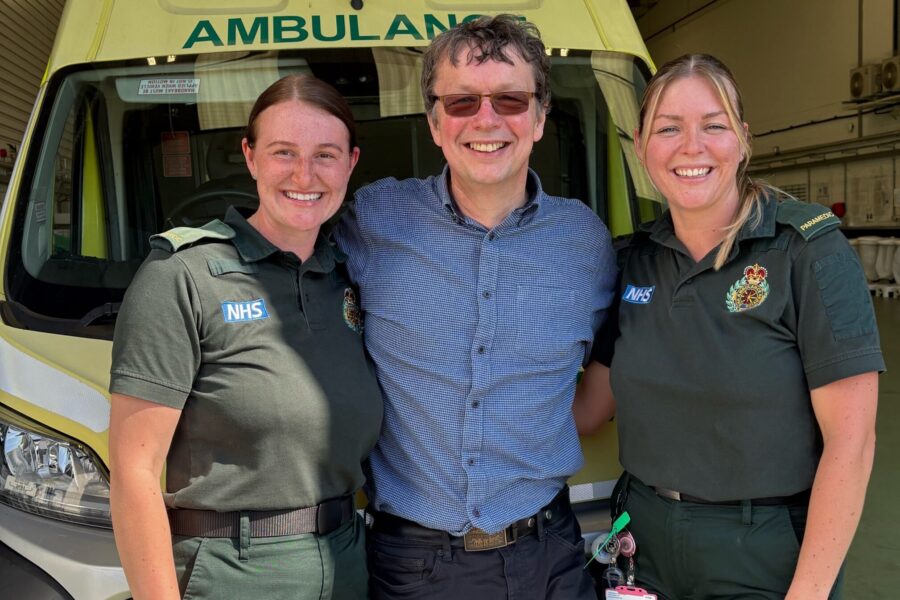
Shaunna Farley – Thursday 16th April 2025 – 8am.
When Peter Roberts suddenly collapsed at work and went into cardiac arrest, his condition was life threatening. But thanks to the swift response of the ambulance staff, with the first crew arriving within just under four minutes, he got a second chance at life.
Cardiac arrest is one of the most critical emergencies an ambulance crew can come across and when the call came in, Nicole Donnelly, Lewis Yates and Jess Jackson from Willenhall Hub, alongside Critical Care Paramedic, James Abel, and Olivia Burke and Libby Darlington from Erdington Hub, put their skills into action. Their intervention played a pivotal role in restarting Peter’s heart and keeping him alive.
After receiving advanced life support at the scene, Peter was rushed to New Cross Hospital, where he underwent cardiac surgery and spent two weeks recovering in October. Six months later, Peter had the emotional opportunity to reunite with the life-saving crew, Jess and Nicole at Willenhall Ambulance Hub on Thursday.
With emotion, he shared, “I’m beyond thankful for everything the ambulance crew did for me that day. It’s clear that it wasn’t my time, thanks to their actions.”
Nicole said: “Responding to a cardiac arrest is always a critical and challenging situation. Saving a life is never a solo effort and we worked as a team to put our training and skills into action.
“I’m incredibly grateful that we were able to intervene when we did. Moments like these remind me why I chose this profession and I’m so proud to do this work and meet Pete again under such positive circumstances. It’s an incredible feeling seeing Pete and knowing he went home to his family because we were there when it mattered most.
Jess said: “It has been so wonderful to be in touch with Peter and hear about his road to recovery.
“These fantastic outcomes are few and far between and I feel extremely proud be able to meet Pete and to work in a profession which enables me to help people and their families during their most difficult moments”.
ENDS.
Notes to Editors
What is a cardiac arrest?
Cardiac arrest is a life-threatening condition where the heart stops beating effectively, ceasing to pump blood and oxygen to the body and brain. This can lead to loss of consciousness, no breathing or gasping, and a lack of pulse, requiring immediate treatment, such as CPR and defibrillation, to restore a normal heart rhythm.
CPR statistics
The benefits of improving bystander Cardiopulmonary Resuscitation (CPR) rates are evidenced around the world where the highest bystander CPR rates are directly linked to the highest survival rates from sudden cardiac arrest. Over 68,000 people suffer cardiac arrests outside of hospital in the UK every year. If this happens in front of a bystander who starts CPR immediately before the arrival of the ambulance, the patient’s chances of survival doubles.